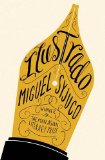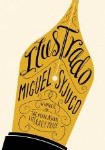
Winner of the 2008 Man Asian Literary Prize
Illustrado begins with the discovery of an author’s body in the Hudson river. The victim was about to publish a controversial novel exposing the corruption present in the Philippines and although the New York Police are convinced that there is no foul play, others suspect that he was murdered. The novel’s narrator, Miguel Syjuco (yes, he is named after the author!) was being mentored by the victim at the time of his death. He heads to the Philippines to try to discover the truth, writing a biography of his teacher in order to gain as much information about the man as possible.
The premise of the novel is quite basic, but the structure is complex and often difficult to understand. The book contains extracts from the fictitious controversial novel, blog posts, newspaper clippings and weird dream sequences. I can’t fault the writing quality, but there were many times when I couldn’t see the relevance of the passage I was reading and was confused about what was happening.
Regular readers of this blog will know that I have struggled with blog posts in books before, unfortunately Illustrado is not an exception to this rule. Perhaps I’m just behind the times, but I found all the blog posts, especially the comments, very irritating. The book also contained annoying sections from emails and texts:
His Nokia tring-trings. Our forlorn protagonist sits up in bed and fumbles in the darkness. He looks at the bright screen of the cell phone. It’s a text message from his old pal Markus: Welcm bak, bro! Old skool tunes all week @ Club Coup d’Etat. Our crew will be there, with Charlie. My treat. DJ Supermodeldiva spinning phat beats. When the screen dims, the hotel room seems to get smaller.
Illustrado is clearly pushing the boundaries in novel writing, but there were many points when I thought it over-stepped the mark – being too clever/innovative for its own good. The passages may be an accurate reflection of modern life, but I often found myself cringing as I read them.
The book reminded me of 2666 by Roberto Bolaño in that both books benefit from being studied – requiring multiple re-readings to really understand what is happening and a study guide to pick up on all the subtle references. Unfortunately I didn’t have the benefit of a study guide or an informed reading partner and so I felt as though I missed out on much of the book’s depth. I recommend reading this book with several other people in the hope that you will all spot different things, as I imagine you’d have a long wait for the study guide!
I’m afraid that I was too irritated by this book to consider re-reading it, but I think it is an important book and some people will love uncovering its many literary layers.
The Picador website has some wonderful interviews with Miguel Syjuco and further information about the book.

36 replies on “Illustrado – Miguel Syjuco”
I’ve got this on my TBR pile and cannot wait to start reading it! Sounds like it will be a challenge, but I like challenges!
sakura, It is a bit of a challenge – I’ll be interested to read your thoughts on it 🙂
I am just coming to the end of 2666 (which has taken the best part of 6 months in several instalments), and like you I am finding it so much better than the sum of its parts. This feels as though it’s both more ambitious (because it weaves in modern life) but less ambitious in its structure. I think it’s the wonderfully rich, overlapping structure of 2666 that gives it its power – without that richness it would just be overlong and a little irritating, which is how it sounds you have found this.
Dan, I think 2666 was wonderful because you could pick any page at random and find wonderful, thought provoking quotes. You may not have known what impact they had on the story, but they were beautiful. If you open Illustrado at random you are more likely to find weird text speak or blog posts than beautiful prose. The rich writing is there, but you have to dig harder to find it. Illustrado isn’t any where near as long as 2666, but I think it is lacking that “sum of the parts” magic. I will be interested to learn what more knowlegable people think of it though.
Well I am certainly glad to have heard this before I read it. At this stage in my life, I really don’t want to have to read something with a smart partner OR have to read it multiple times in order to enjoy it. That is just way too much work. Books should be an escape and a hobby, not a task! I do, however, generally fawn over things that are clever and different, so now I am thinking if I would recognize the fine line between “brilliant” and “too much”.
Sandy, It is a fine line between brilliant and too much. I think much of this book was brilliant, but it did cross that line occasionally. This is a book that does require work, so you should avoid it if you are not prepared for some degree of study.
I’ll wait until after the author’s event at Edinburgh before reading this then.
lizzysiddal, I would be interested to go to an event with Miguel Syjuco so am a bit jealous that you are going to an event with him. I hope you get the chance to tell us all about it afterwards.
I ve this on my wishlist Jackie it does sound very good if a little experemental ,all the best stu
Stu, Experimental is a good word for this book. I look forward to hearing your thoughts on it.
The passage you quoted killed any curiosity I had about this novel. I feel like I should feel an interest since it seems to be a book that many are interested in, but I don’t know.
Iris, It isn’t all like that. I probably should have quoted some beautiful section too, but I just wanted to illustrate what annoyed me about the book. Sorry to hear I’ve killed your interest – I’d have liked to learn your thoughts on it.
I have to agree with you, based on the bits of this one I’ve looked at. I think a fiction book has to do more to deserve study before it requires it.
Jeanne, I’m sure anyone who studied this book would be rewarded, but I’m afraid it isn’t something I’m very good at doing. I’d love to read the study guide if/when it was produced!
“The book reminded me of 2666 by Roberto Bolaño…”
That’s all I needed to read before feeling like I wanted to run in the other direction! 😉
Steph, LOL! I’m sure you’ll fall in love with Bolano one day 😉
Hmmm… I’ve mentioned before that things like blog posts and comments interrupt my reading and slow me down, kind of jar me from the story, so I might avoid this one until I can overcome that. Congrats on getting through it though with all those distractions!
Amy, Perhaps one day in the future we’ll all be used to it, but for now I do find it distracting. Not sure I deserve congratulations for finishing it though – its much easier to read than Ulysses 🙂
Novels can certainly be interesting when writers play with the limits between fiction and reality, Paul Auster has proved that, but as you say, the style can also be too advanced for its own good. There is a reason why textese is only used for short texts!
Dorte, I still haven’t read any Paul Auster – I even own a few of his books. I need to get one off the shelf soon 🙂
But if you want to try an author who can play with conventions & genres in an expert way, you should read his “City of Glass” (first part of the New York trilogy – I don´t like the second and third part nearly as much).
Ugh – that quote is dreadful! Sorry, I probably should say that slightly more euphemistically, but, it’s the only word that came to my mind when I read it.
I don’t think I’ll be reading this one, much as I like experimental writing.
anothercookiecrumbles, LOL! I admire your honesty 🙂 Sometimes it is nice to strike a book from the list!
All the Filipino bloggers have created some buzz for the book so it is is on my radar. I’ve been unsure however if I want to read it. One word that lost me is “political”.
mee, I’m not a fan of political books either. The politics isn’t that big a part of this book, but I guess it is always there, bubbling under the surface. Perhaps I have more tolerance for the politics of this book as I don’t know much about it? While the politics of my own country makes me run a mile from a book?
Eek! I’ve heard about this, but I am like you — I cannot stand when texting becomes a part of a story and the format of it isn’t adjusted appropriately. I fear I would be incredibly annoyed by this as well — I may take a look at it, but will bear your post in mind. Thanks for the heads up!
Natalie, I have never used text speak – even in texts! I guess I’m just not with it. 🙂
Totally not reading your post (la la la, I can’t see anything) as I have just received a review copy of this and shall begin reading it on the train to work tomorrow.
I promise I’ll come back once my review’s done though 😉
Just finished ‘Ilustrado’ (review up now), and I liked it a lot (I especially liked the way the ending played out…). No Booker nomination, but I’ve just started wondering whether it was eligible. Does Syjuco have Canadian citizenship? The Philippines aren’t in the Commonwealth, that much I know 🙂
Tony, I’m so sorry I missed your comments – no idea how that happened 🙁 I’m sure I read somewhere that this was eligible, but I have no idea why! I’m guessing that it wasn’t actually true though.
[…] Jackie also reviewed this […]
Adored 2666 so this has me intrigued, also like books that experiment with their structure, so will seek this out.
Thanks, Parrish
Parrish, Thank you for commenting on my blog for the first time 🙂
If you like books that experiment with structure then I’m sure you’ll love this – it certainly doesn’t stick to a conventional style!
[…] Illustrado by Miguel Syjuco […]
[…] 2008 Winner: Illustrado by Miguel Syjuco […]
[…] “I’m afraid that I was too irritated by this book to consider re-reading it, but I think it is an important book and some people will love uncovering its many literary layers.” Farm Lane Books […]